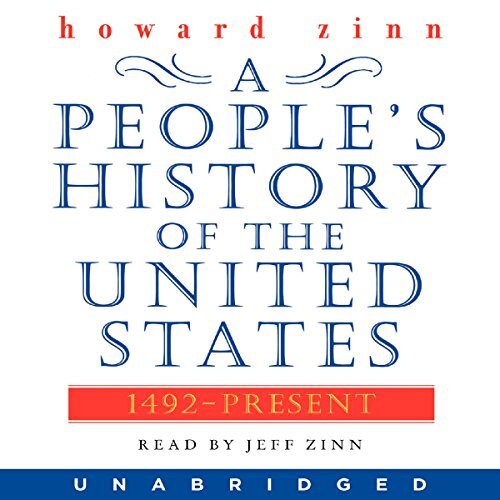
This is one of those books where a 5-star rating cannot adequately capture my impressions. I would argue that this book is deeply flawed, but still well-worth reading for just about everyone. In fact, the book is disturbingly relevant today, as I write this review, as it just happens to be the day Donald Trump is being inaugurated as president of the US. I can’t help but wonder if this atrocity could have been avoided had more people spent a little more time studying history.
The goal of the book, as implied by the title, is to tell history not from the perspective of government institutions and the elite, but instead to show the perspective of “the people”. This begs the question: which people, exactly? It turns out that Zinn’s definition of “people” is “oppressed people”. The entire book focuses on Native Americans, African Americans, women, and all the other groups that have suffered throughout US history. This is an important story to tell and one that most people don’t know. Once you’ve read about the astonishing amount of sexism, racism, corruption, violence, and lying in US history, it’s less surprising the country elected such a sexist, racist, corrupt, violent, pathological liar in 2016.
However, just as focusing solely on institutions and elites gives you a distorted view of history, so does focusing solely on oppressed groups. Making that even worse is that Zinn almost exclusively focuses on all the things that went wrong: all the violence, massacres, lies, betrayals, mistakes, and so on. Again, it’s important to bring these atrocities to light. But Zinn’s story telling is extremely one-sided. What was the other side of the issue? What would’ve happened had a different decision been made? What were the trade-offs that had to be considered? Instead of telling the story of “the people”, it often seems like Zinn’s real agenda is to portray the elites of US history as villains. Some of them unquestionably did horrible things, but many of them were normal people faced with difficult choices, and I’m not a fan of a historian, of all people, condemning someone from the past based on modern-day values, without considering the historical context in which they made their decisions.
One of Zinn’s main arguments is that the goal of the US government through all of its history has been to serve the interests of the rich elite while granting just enough to everyone else to avoid riots. There is certainly truth to that, though I’d argue it’s too negative of a view. Zinn prefers to focus on all the flaws in capitalism and democracy, all the while ignoring the fact that the average quality of life for everyone in the US, and most capitalistic countries, has been steadily improving throughout history. This is not to say horrible acts weren’t committed along the way, or that the system couldn’t be improved, but the empirical, historical data is clear: modern capitalistic societies are richer, safer, healthier, happier, and more egalitarian than at any systems at any other time in history.
On the other hand, Zinn offers praise throughout the book for socialist ideals. In the epilogue, he even suggests something that sounds an awful lot like communism as his solution to all the problems caused by capitalism. Given that every single communist system in history has been a miserable failure that created horrendous conditions for its citizens, I can’t understand why a historian would ever think of that as a good idea.
